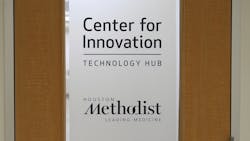Houston Methodist’s Center for Innovation just opened its new Technology Hub on Jan. 30 to work with clinicians on digital health breakthroughs. But due to the COVID-19 crisis, the hospital has turned the tech lab into a telemedicine and physician mobile tool training and simulation center.
Josh Sol, Houston Methodist’s administrative director of innovation and ambulatory clinical systems, said that the health system has drastically ramped up its telehealth efforts in the wake of the emergency. “The number of physicians we are training now is exponential compared to what we have done in the past,” he said. “We normally see 28 virtual visits per day. Today we had 120. We have grown so much.” He said the organization had to pivot so it could bring in more physicians and get them trained. If a patient goes into isolation, we have iPads ready, so they can use it to attend group therapy sessions, he said. “We also had a huge growth in the number of primary care doctors and specialists doing scheduled virtual appointments to protect our patients and keep them out of the office.”
Also on the coronavirus front, Houston Methodist was the first in the country to launch electronic case reporting a year and a half ago through Digital Bridge, a Centers for Disease Control program, Sol said. “The great part about it is we are partnering with the CDC and Epic to make sure we have the appropriate codes in our EHR and are able to actively trigger electronic case reports to the CDC as they are coded. We still have manual processes in place to make sure we are double checking and reporting to the Houston Health Department. The advantage of Digital Bridge is that we are connecting and have flexibility to deliver electronic case reports in real time.”
The Center for Innovation has been around for about three years, Sol said. About 14 months ago they started to talk about creating a Technology Hub, “where we could plant our stakes in the ground around digital innovation and create this living laboratory. After 14 months of work, we just launched the hub on Jan. 30. It has been a three-year journey.”
Unlike innovation centers at UPMC and Providence that build solutions from the ground up or Cedars-Sinai, which has a business accelerator, the Center for Innovation at Houston Methodist is more of a procurement group. “We focus in on our existing vendor partners and work to build and support their roadmap on how they can disrupt healthcare,” Sol said. “For example, we partner closely with Epic to deliver new approaches with their system. We recently partnered with Amazon to do ambient listening strategies in our outpatient rooms so we can capture sound in an outpatient visit. We have built a prototype that we are working with Amazon on. We are trying to figure out what happens and where the pitfalls are and what microphones to use and where to place them.”
Sol said ambient listening can be a true game-changer in terms of EHR optimization and easing physician documentation burden. “If we can capture sound and through AI know who is speaking, be able to transcribe the message and code it, and be able to keep all the quality metrics and building blocks of the EHR intact, but use just voice, we will have accomplished a game-changing goal,” he said. “So we are focused in on it, and our physician champions are excited to help us work on that.”
Houston Methodist also is working with Apple on a mobile-first strategy trying to increase patient empowerment in an inpatient room, “where you can control the lighting or stream your Netflix or Hulu and create a powerful environment to allow patients to feel in control of that room while seeking care,” he explained.


